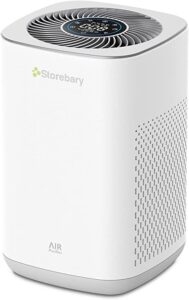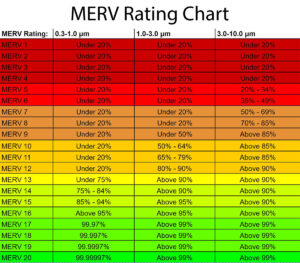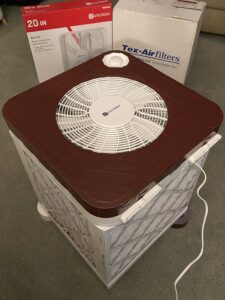Not only because of the aviation emissions, but also because of roadway emissions, the increasing prevalence of wildfires, and, if you have a Port Package, the increased risk of indoor mold.
So many choices…
However, the question of which kind and what brand to get quickly begins to get complicated and expensive. Also, many manufacturers use a galaxy of meaningless buzzwords. If you’re the kind of person who likes to “do the research” and obsess on the arcana of airflow, you could do a lot worse than to check out Clean Air Crew. Hours of fun.
But for those of us with lives…
HEPA
 Genuine HEPA filter systems are quiet, unobtrusive and there are now many good brands available. Consumer Reports and New York Times Wirecutter have both had good reviews on costs and features. The one thing you want to check for is that the unit and filters carry an AHAM certification.
Genuine HEPA filter systems are quiet, unobtrusive and there are now many good brands available. Consumer Reports and New York Times Wirecutter have both had good reviews on costs and features. The one thing you want to check for is that the unit and filters carry an AHAM certification.
Again, for people with lives, you could stop there and call it good.
But you’re one of those people who likes to do the research, so here’s where it gets confusing:
- If you read the specs it would seem that HEPA filtration doesn’t seem to capture Ultrafine Particulates. And UFPs are the central component of commercial aviation emissions. Modern jet engines display no visible exhaust. That doesn’t mean it’s not there, it just means that the combustion particles are so teeny, tiny they don’t present as ‘smoke’. Out of sight. Out of mind. But just as bad as the larger sizes.
- However, in empirical studies, like the UWDEOHS Heathy Air, Healthy Kids Project, HEPA purifiers have shown great efficacy in reducing UFPs. This is a case where something is known to be true, but the peer-reviewed paper has simply not yet been written.
What’s it gonna be, MERV?

Again, if you just look at spec sheets, it would appear that, to filter out UFPs, you need MERV. No, not that outrageously French guy from The Matrix. And no, not that talk show host guy. MERV stands for Minimum Efficiency Reporting Values. You’ll want a rating of MERV 13 or 14 because that seems to provide the best value for money. Not only do MERV filters get spendy as you go up the scale, they also require increased air flow–3possibly taxing for older HVAC systems not designed with as much ‘ooomph’. It gets even more confusing because there is currently a lack of standardization among various filter brands. MERV filters have a use case, but thus far it seems to be mostly in commercial buildings, including schools with modern HVAC systems.
Healthy air on a budget…
We’d all like to say that “our health is priceless”, but for many families, cost is important. Again, AHAM Certified HEPA AIr Purifiers are a great choice for most people. But your choice will also depend on other factors such as your existing living space and HVAC system.
But here are a few use-case scenarios to consider:
- If you do not have an HVAC system, if you want something you can just plug in and go, if you want the quietest possible machine, if you live in a place that gets considerable auto/truck traffic, or you live next to a general aviation airport (like King County International), consider a HEPA filter because road emissions and lead will be the dominant issues, plus it will help with general purpose respiratory issues.
- If you live in a spot that has relatively little auto/truck traffic, and your issue is mainly big jets, and you have an existing HVAC system, and you have extra dollars to spend, you might consider switching to MERV 13 or 14 filters. That will do all the work of HEPA systems and will also filter out many (but not all) UFPs. Just make sure they’re compatible with your equipment and that you (sorry) “do the research”, because the efficacy of various brands is variable.
-

A true Corsi-Rosenthal Box, consisting of a box fan and five HEPA 13 filters. OK, but what if you don’t have an HVAC system and don’t think HEPA is good enough in filtering out UFPs? There are commercial MERV-based products, but they are crazy expensive. However, if you don’t mind doing a bit of work, you might want to consider making your own Corsi-Rosenthal box, a gizmo invented during the COVID epidemic as a possible way to filter out viruses–in the same size range as UFPs. Depending on one’s skills, they can look very presentable, or they can look like a Rube Goldberg contraption. 1It’s completely up to you!
Regardless, Corsi-Rosenthal boxes are inexpensive, and in at least 2one peer-reviewed study were suggested to offer at least as good performance as crazy expensive commercial systems.
The down sides? Although various users swear they can be ‘quiet’, our experience has been that they sound just like what they are: a box fan, which is likely not as quiet as a HEPA Air Purifier. Also, there is the slight inconvenience of having to basically re-build it every time you change the filters. But they do work and are worth mentioning.
Doing nothing is the only bad option…
For most people, a home HEPA purification system that is AHAM certified will be a big step forward. But so long as you choose either of the validated solutions (HEPA or MERV 13/14) feel good about it.
Although some systems will appear to perform better ‘on paper’ (eg. on Ultrafine Particles) every solution is waaaaaaaaaay better than doing nothing. The evidence of various harms is constantly changing, but the scientific consensus is that every form of air pollution, indoor and outdoor, have a profound weathering effect on human beings. Apart from any specific disease, long term exposure to air pollution diminishes the quality of life and the length of life in your community. Simple as that.
Anything one can do to reduce your exposure to any of the various bad actors will improve your long term health outcomes.
1To be fair, some of the more adorable designs do not perform as well as the baseline design.
2Characterizing the performance of a do-it-yourself (DIY) box fan air filter (tandfonline.com)
3Caveat emptor: check with your HVAC manufacturer to make sure your system will work properly with any replacement filter.

There is a grant the pays for these types of filters for children and seniors who live under the SEATAC runway paths.could you please give me that information?